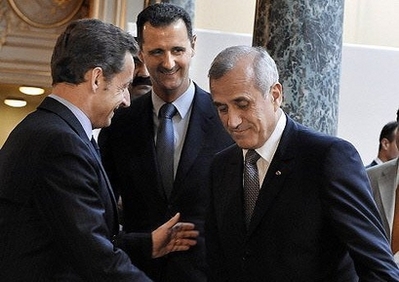 PARIS (AFP) – Lebanon and Syria have agreed to establish diplomatic relations, opening embassies in each others’ capitals for the first time since their independence from colonial rule. French President Nicolas Sarkozy announced the landmark decision Saturday following talks with Syrian President Bashar al-Assad and Lebanese President Michel Sleiman, whose election in May ended a drawn-out political crisis in Lebanon. "For France, this is historic progress," Sarkozy told a press conference. "Of course there are a number of legal questions that have to be settled… but for us… this announcement is absolutely historic. It is great news for all those who love Lebanon and are concerned by developments there," he said. Presidents Assad and Sleiman confirmed the news at a joint press conference later on Saturday. "Our position is that there is no problem for the opening of embassies between Syria and Lebanon," said Assad. "If Lebanon is willing to exchange embassies, we have no objections to doing it," he added. For Lebanon, Sleiman confirmed that the two governments were going to "work together to put everything in motion as soon as possible."
PARIS (AFP) – Lebanon and Syria have agreed to establish diplomatic relations, opening embassies in each others’ capitals for the first time since their independence from colonial rule. French President Nicolas Sarkozy announced the landmark decision Saturday following talks with Syrian President Bashar al-Assad and Lebanese President Michel Sleiman, whose election in May ended a drawn-out political crisis in Lebanon. "For France, this is historic progress," Sarkozy told a press conference. "Of course there are a number of legal questions that have to be settled… but for us… this announcement is absolutely historic. It is great news for all those who love Lebanon and are concerned by developments there," he said. Presidents Assad and Sleiman confirmed the news at a joint press conference later on Saturday. "Our position is that there is no problem for the opening of embassies between Syria and Lebanon," said Assad. "If Lebanon is willing to exchange embassies, we have no objections to doing it," he added. For Lebanon, Sleiman confirmed that the two governments were going to "work together to put everything in motion as soon as possible."
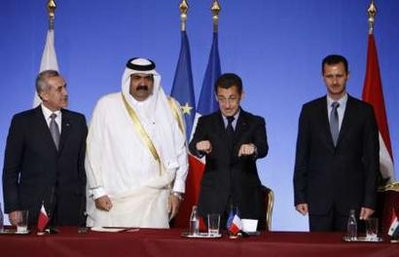 According to Suleiman, the legal and administrative arrangements needed to implement "this agreement would be taken as soon as possible in coordination between the two capitals," Beirut and Damascus. "We look forward to tackling the topic of demarcating the Lebanese-Syrian borders through the required mechanism based on the brotherly relations between the two sisterly states," Suleiman said. He said Lebanon is "committed to regaining its full sovereignty over the Shebaa Farms," an area occupied by Israel since 1967. Answering reporters’ questions as to whether Lebanon would go into peace talks with Israel, Suleiman said: "We expect Israel to implement international resolutions, especially UN Security Council Resolution 1701 that was adopted two years ago and Israel has not pulled out of the Ghajar (village) Shebaa Farms and Kfar Shouba hills." On May 24, 2000, Israel withdrew its troops from a large territory in southern Lebanon, which it had been occupying since 1978. A significant issue relating to the withdrawal remains unsettled. This relates to the status of certain villages and adjacent land on the eastern side of Alsheikh Mountain, known as the Shebaa Farms. The Lebanese government advised the United Nations that it considers the area to be Lebanese territory and that, as such, the withdrawal must encompass it. Israel insists that the land was captured from Syria in 1967 and its fate should be discussed in future peace talks between Israel and Damascus. Meanwhile Druze leader Walid Jumblatt, a key member of Lebanon’s ruling majority, lashed out at France for receiving the Syrian president. "Receiving the head of the Syrian regime by the French leadership is a clear disrespect to the feelings of the Lebanese people and its prisoners who are still held in Syria," Jumblatt told a group of his followers on Sunday. No-one knows exactly how many Lebanese political prisoners are in Syrian jails. Syria and Lebanon’s former pro-Syrian president Emile Lahoud have denied there are any. They claim all political prisoners were released in December 2000. But Ghazi Aad, head of a group called SOLIDE (Support of Lebanese in Detention and Exile) said he has been working with the families of detainees for 15 years. He added that his organization has files on 176 known detainees in Syrian prisons and there could be more.
According to Suleiman, the legal and administrative arrangements needed to implement "this agreement would be taken as soon as possible in coordination between the two capitals," Beirut and Damascus. "We look forward to tackling the topic of demarcating the Lebanese-Syrian borders through the required mechanism based on the brotherly relations between the two sisterly states," Suleiman said. He said Lebanon is "committed to regaining its full sovereignty over the Shebaa Farms," an area occupied by Israel since 1967. Answering reporters’ questions as to whether Lebanon would go into peace talks with Israel, Suleiman said: "We expect Israel to implement international resolutions, especially UN Security Council Resolution 1701 that was adopted two years ago and Israel has not pulled out of the Ghajar (village) Shebaa Farms and Kfar Shouba hills." On May 24, 2000, Israel withdrew its troops from a large territory in southern Lebanon, which it had been occupying since 1978. A significant issue relating to the withdrawal remains unsettled. This relates to the status of certain villages and adjacent land on the eastern side of Alsheikh Mountain, known as the Shebaa Farms. The Lebanese government advised the United Nations that it considers the area to be Lebanese territory and that, as such, the withdrawal must encompass it. Israel insists that the land was captured from Syria in 1967 and its fate should be discussed in future peace talks between Israel and Damascus. Meanwhile Druze leader Walid Jumblatt, a key member of Lebanon’s ruling majority, lashed out at France for receiving the Syrian president. "Receiving the head of the Syrian regime by the French leadership is a clear disrespect to the feelings of the Lebanese people and its prisoners who are still held in Syria," Jumblatt told a group of his followers on Sunday. No-one knows exactly how many Lebanese political prisoners are in Syrian jails. Syria and Lebanon’s former pro-Syrian president Emile Lahoud have denied there are any. They claim all political prisoners were released in December 2000. But Ghazi Aad, head of a group called SOLIDE (Support of Lebanese in Detention and Exile) said he has been working with the families of detainees for 15 years. He added that his organization has files on 176 known detainees in Syrian prisons and there could be more. 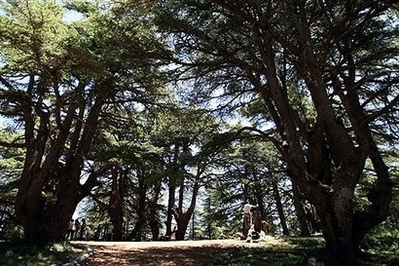 by Rana Moussaoui
by Rana Moussaoui 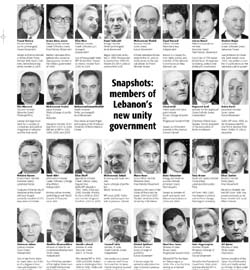 By Hussein Abdallah, BEIRUT: Lebanon announced a 30-member national unity government on Friday after almost five weeks of disputes over the distribution of portfolios. The lineup was announced in a decree signed by President Michel Sleiman and Prime Minister Fouad Siniora following a short meeting between them and Parliament Speaker Nabih Berri. The formation of the Cabinet came in line with the accord sealed in Doha on May 21 which allocated 16 cabinet seats to the parliamentary majority, 11 to the opposition, and three to the president.
By Hussein Abdallah, BEIRUT: Lebanon announced a 30-member national unity government on Friday after almost five weeks of disputes over the distribution of portfolios. The lineup was announced in a decree signed by President Michel Sleiman and Prime Minister Fouad Siniora following a short meeting between them and Parliament Speaker Nabih Berri. The formation of the Cabinet came in line with the accord sealed in Doha on May 21 which allocated 16 cabinet seats to the parliamentary majority, 11 to the opposition, and three to the president. 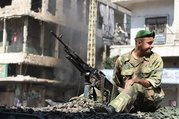 by Omar Ibrahim
by Omar Ibrahim 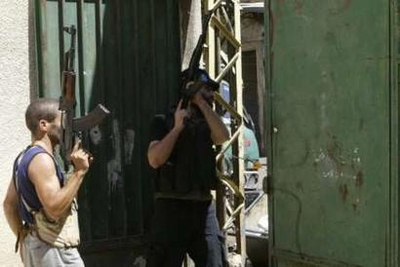 by Omar Ibrahim
by Omar Ibrahim 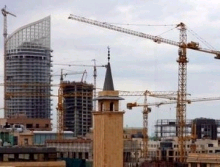 BEIRUT: Lebanon expects over 1.3 million tourists this year thanks to the positive political atmosphere following the election of a new president, outgoing Tourism Minister Joe Sarkis said Friday. The minister made the remarks during a tour of Rafik Hariri International Airport, adding that most of the hotels in Beirut and the mountain are fully booked. According to the figures released by Rafik Hariri International Airport, arriving passengers totaled 598,392 in the first five months of the year, while departing passengers amounted to a higher 633,255.
BEIRUT: Lebanon expects over 1.3 million tourists this year thanks to the positive political atmosphere following the election of a new president, outgoing Tourism Minister Joe Sarkis said Friday. The minister made the remarks during a tour of Rafik Hariri International Airport, adding that most of the hotels in Beirut and the mountain are fully booked. According to the figures released by Rafik Hariri International Airport, arriving passengers totaled 598,392 in the first five months of the year, while departing passengers amounted to a higher 633,255. 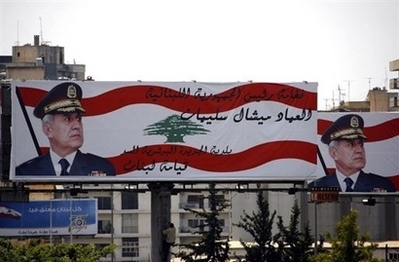 Lebanese President Michel Suleiman has set July 9 as a deadline to conclude the formation of a new government in the country, well informed sources were quoted by Xinhua news agency. The president is due to leave for Paris on July 12 to participate in the international conference on Euro-Mediterranean cooperation, the report added, hinting that a new government should be formed before the president leaves. Over five weeks have passed since designated-Prime Minister Fouad Seniora was assigned by the president to form a national unity government, but all efforts were fruitless as Lebanese leaders were unable to reach an agreement on the cabinet line-up.
Lebanese President Michel Suleiman has set July 9 as a deadline to conclude the formation of a new government in the country, well informed sources were quoted by Xinhua news agency. The president is due to leave for Paris on July 12 to participate in the international conference on Euro-Mediterranean cooperation, the report added, hinting that a new government should be formed before the president leaves. Over five weeks have passed since designated-Prime Minister Fouad Seniora was assigned by the president to form a national unity government, but all efforts were fruitless as Lebanese leaders were unable to reach an agreement on the cabinet line-up. 


